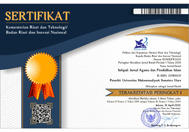Pendidikan Anak Usia Dini dalam Persfektif Alquran
Abstract
This study aims to determine the elements of early childhood education in the perspective of the Koran. This type of research is library research. In analyzing the data that has been collected the author uses the tahlili method (analysis), which is a method of interpretation used by the commentators in analyzing the content of the verses of the Qur'an. The explanation begins with verses that will explain, explain the description of the contents of the surah, explain the meaning of the lafaz contained in it and then the verses that are clearly described and analyzed so that conclusions can be drawn. The results of the study showed that: 1) Parents as educators for children have roles, including: fostering the religious spirit of children from an early age, developing children's potential and creativity, meeting nutritional needs for children's intelligence. Provide a lawful living for children; 2) The main educational materials that must be taught to early childhood, before other educational materials are given, include: aqidah education and moral education; 3) Learning methods that can be used to carry out education in early childhood, based on QS. Al-Baqarah: 233, Al-An'am: 140, and Ar-Rum: 30, namely: methods of affection, exemplary and habituation methods.
Keywords
Full Text:
PDFReferences
Akbar, E. (2002). Metode Belajar Anak Usia Dini. Jakarta: Prenada Media.
Al-Jauziyyah, I. Q. (2014). Tuhfatul Maudud bi Ahkam Maulid. Jakarta: Ummul Qura.
Asrori, M. M. (1983). Terjemah Barsanji. Surabaya: Mitra Umat.
Az-Zuhaili, W. (1991). Tafsir al-Munir fi al-`aqidah wa asySyar`iah wa al-Manhaj. Damaskus: Darul Fikri.
Darajat, Z. (1992). Pendidikan Islam dalam Keluarga dan Sekolah. Jakarta: Ruhama.
Fadillah, M. (2013). Pendidikan Karakter Anak Usia Dini. Yogyakarta: Ar-Ruzz Media.
Faizah, N. (2008). Sejarah Al-Quran. Jakarta: Artharivera.
Fatah, A. (2009). 40 Metode Pendidikan dan Pengajaran Rasulullah , (Bandung: , 2009), h. 79. Bandung.
Halim, M. N. A. (2001). Anak Soleh Dambaan Keluarga. Yogyakarta: Mitra Pustaka.
Hamka. (1992). Tafsir Al-Azhar. Jakarta: Pustaka Panjimas.
Mashumah, L. A. (2001). Pembinaan Kesadaran Beragama Pada Anak. Yogyakarta: Pustaka Belajar.
Masganti. (2015). Psikologi Agama. Medan: Perdana Publishing.
Mursid. (2009). Kurikulum dan Pendidikan Anak Usia Dini (PAUD) Sebuah Harapan Masyarakat. Semarang: Aktif Media.
Sanusi, A. (2016). Metodologi Penelitian Bisnis. Jakarta: Salemba Empat.
Sanusi, U. (2012). Ilmu Pendidikan Islam. Yogyakarta: Deepublish.
Setiawan, H. R. (2017). Pengaruh Konsep Diri, Minat dan Inteligensi Terhadap Hasil Belajar Mahasiswa Pada Mata Kuliah Metode Pengembangan Kemampuan Bahasa Anak. Intiqad: Jurnal Agama Dan Pendidikan Islam, 9(2), 23.
Shalih, A. H. (2008). Mendidik anak laki-laki. Jakarta: Gema Insani Press.
Shihab, M. Q. (2012a). Kaidah Tafsir. Jakarta: Lentera Hati.
Shihab, M. Q. (2012b). Tafsir Al-Misbah. Jakarta: Lentera Hati.
Yusuf, S. (2018). Psikologi Perkembangan. Bandung: Remaja Rosdakarya.
DOI: https://doi.org/10.30596/intiqad.v13i1.7001
Refbacks
- There are currently no refbacks.
Intiqad Jurnal Agama dan Pendidikan Islam is abstracting & indexing in the following databases:
View My StatsEditorial Address:
Faculty of Islamic Religion, Universitas Muhammadiyah Sumatera Utara. Jl. Mukhtar Basri No. 3 Medan 20238 Telp. (061) 6622400 ext. 27 dan 28 Fax. (061) 6625474. e-mail: intiqad@umsu.ac.id

























